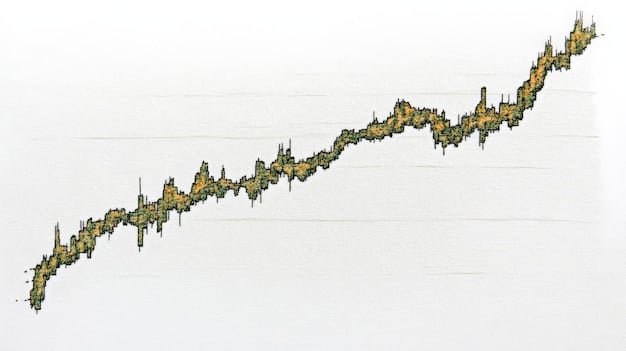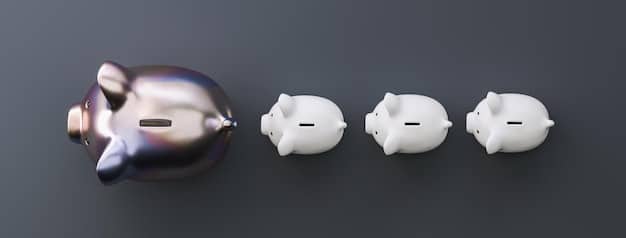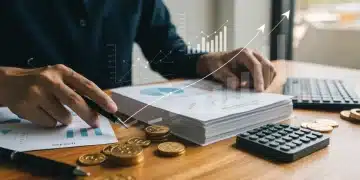Inflation in 2025: How a Projected 3.2% Increase Will Affect Your Budget

A projected 3.2% inflation increase in 2025 will likely raise the cost of goods and services, potentially impacting your personal budget by increasing expenses for food, housing, transportation, and healthcare, requiring adjustments to spending and savings strategies.
The prospect of a 3.2% inflation increase in 2025 brings with it questions about how it will affect your wallet. Understanding how will the projected 3.2% inflation increase in 2025 impact your personal budget? is more crucial than ever for financial stability. Let’s delve into the specifics to help you prepare.
Understanding Inflation: A Primer
Before diving into the specifics of the projected 3.2% increase, it’s important to understand just what inflation is and how it broadly affects the economy.
What is Inflation?
Inflation refers to the rate at which the general level of prices for goods and services is rising, and subsequently, purchasing power is falling. In simpler terms, it’s how much more things cost over time.
How is Inflation Measured?
Inflation is typically measured using the Consumer Price Index (CPI), which tracks the average change over time in the prices paid by urban consumers for a basket of consumer goods and services. The Bureau of Labor Statistics (BLS) calculates the CPI monthly.

Knowing how inflation is gauged helps in understanding its potential effects on your personal finances. Now, let’s see what a 3.2% rise could specifically mean to you. Understanding this macroeconomic indicator can assist in anticipating the ripples throughout various sectors.
The Direct Impact of a 3.2% Inflation Increase on Daily Expenses
A 3.2% inflation increase might seem small, but it can add up over time, significantly affecting your day-to-day expenses.
Food and Groceries: Expect to pay more at the grocery store. Even a slight percentage increase can make a noticeable difference in your monthly food bill.
Housing Costs: Rent and property taxes might see an uptick. If you have a mortgage with adjustable rates, your monthly payments could increase.
Transportation: Gas prices, public transportation fares, and the cost of maintaining a vehicle are likely to rise, affecting your commute and travel expenses.
- Utilities: Electricity, water, and heating bills are also prone to inflation increases, affecting household budgets.
- Healthcare: Medical services and prescription drugs often increase in price during inflationary periods.
- Education: Tuition fees and the cost of educational materials may similarly be impacted by the rise in inflation.
So, everyday needs such as food, clothing, transportation, and housing will all likely become more expensive. Careful planning is essential to mitigate these impacts.
How Inflation Affects Savings and Investments
Inflation not only impacts your immediate expenses but also affects your long-term savings and investment strategies.
Erosion of Savings Value
If your savings accounts yield interest rates lower than the inflation rate, the actual value of your savings decreases over time. Your money loses purchasing power.
Investment Strategies in an Inflationary Environment
Consider investments that historically perform well during inflation, such as real estate, commodities, or inflation-protected securities (TIPS). Diversification is key to navigating inflationary periods.

Understanding these risks means adopting a proactive stance in managing and adjusting diverse investment strategies. This ensures that savings are protected and potentially grown amidst economic headwinds.
Strategies to Combat Inflation’s Impact on Your Budget
While you can’t control inflation, there are several strategies you can implement to protect your personal budget.
Budgeting and Expense Tracking: Monitor where your money is going. Identify areas where you can cut back and reallocate funds to essential expenses.
Negotiate Bills: Call your service providers (internet, insurance, etc.) and negotiate for better rates. Competition can work in your favor.
Seek Additional Income: Consider a side hustle or freelance work to supplement your income and offset rising costs.
- Refinance Debt: If interest rates are favorable, refinance your mortgages or other loans to lower your monthly payments.
- Energy Efficiency: Reduce utility bills by improving your home’s energy efficiency, such as using energy-efficient appliances and better insulation.
These targeted actions offer proactive means to cushion the blow of economic pressures. Tailoring these methods allows for customized financial resilience.
Adjusting Your Financial Goals in Response to Inflation
Inflation can throw a wrench in your long-term financial plans. Adjustments may become necessary to stay on track with your goals.
Revisit Retirement Plans
Calculate how inflation might affect the future value of your retirement savings. Consider increasing your contributions to counteract the effects.
Reassess Investment Portfolio
Make sure your investment portfolio is aligned with your risk tolerance and considers inflation-hedging assets. Adjust accordingly to ensure alignment with evolving economic conditions.
Emergency Fund: Ensure you have an adequate emergency fund to cover unexpected expenses without derailing your financial plans.
Reevaluating and recalibrating financial objectives in sync with unfolding economic scenarios can keep one grounded and focused. These adaptive strategies ensure the sustainability of one’s financial roadmap.
The Broader Economic Effects of Inflation
Inflation isn’t just a personal finance issue; it has widespread effects on the overall economy.
Interest Rate Hikes: Central banks may raise interest rates to combat inflation. This can affect borrowing costs for businesses and consumers.
Wage Adjustments: Workers often demand higher wages to keep pace with inflation, which can further fuel price increases.
Business Investments: Inflation can create uncertainty for businesses, potentially leading to decreased investment and slower economic growth.
- Reduced Consumer Spending: As prices rise, consumers may reduce their spending, which can negatively impact economic activity.
- Increased Government Debt: Governments may face increased costs, leading to higher budget deficits and increased national debt.
Comprehending these large-scale dynamics gives a fuller perspective on economic undercurrents and provides a backdrop for decisions related to personal finances. Staying informed creates a heightened level of preparedness.
| Key Point | Brief Description |
|---|---|
| 📈 Rising Expenses | Expect increases in food, housing, transportation, and healthcare costs. |
| 💰 Savings Erosion | Inflation reduces the purchasing power of savings if interest rates are low. |
| 💡 Budgeting & Tracking | Monitor expenses, cut back where possible, and reallocate funds. |
| 💼 Investment Adjustments | Consider inflation-hedging assets like real estate and TIPS for investment adaptation. |
Frequently Asked Questions
▼
The CPI measures the average change over time in the prices paid by urban consumers for a basket of consumer goods and services, used to calculate inflation.
▼
Inflation reduces the future purchasing power of your retirement savings, potentially requiring increased contributions to maintain your desired lifestyle.
▼
Investments like real estate, commodities, and Treasury Inflation-Protected Securities (TIPS) often perform well during inflationary periods.
▼
Lowering expenses can be achieved by cutting non-essential spending, negotiating bills, and improving your home’s energy efficiency to reduce utility costs.
▼
Yes, you should adjust your budget to account for higher prices by tracking expenses, identifying areas to cut back, and seeking additional income if necessary.
Conclusion
Understanding how a projected 3.2% inflation increase will impact your personal budget in 2025 enables you to adapt and protect your financial stability. By taking proactive steps to manage your budget, savings, and investments, you can navigate inflationary pressures successfully and continue to work towards your financial goals.





